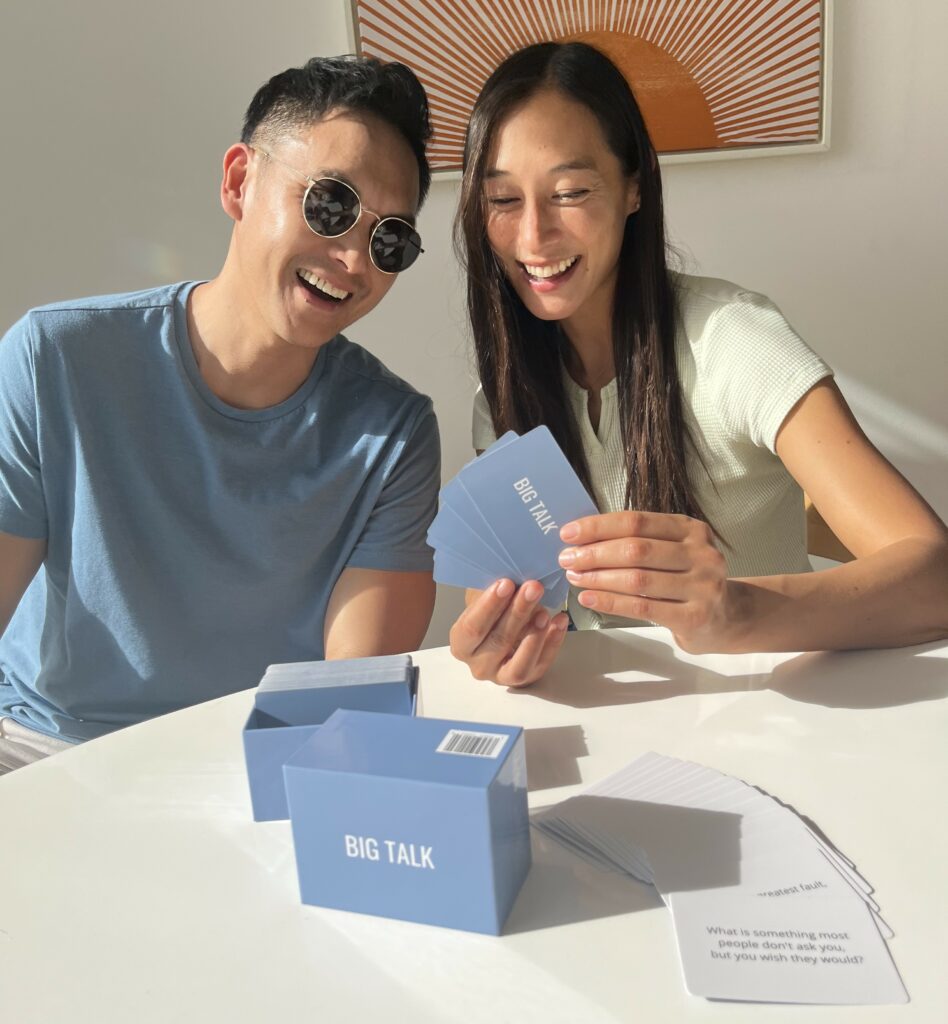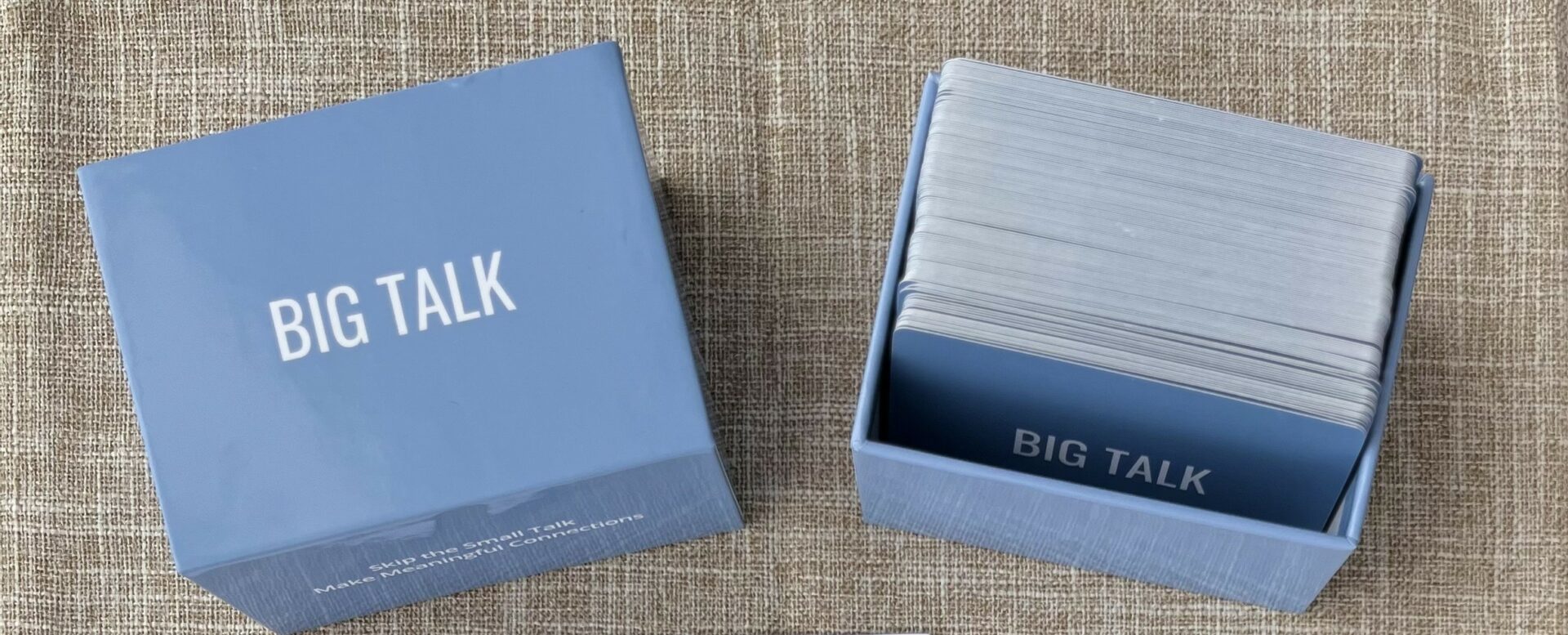When I started “Big Talk” (now a global movement, video series, events program, and card game), I had a simple goal: Skip small talk to foster more meaningful connections with people. I wanted to help fight modern-day loneliness, build empathy and curiosity for our shared human experiences, and build a greater sense of community belonging.
This project has now also become a valuable tool for families navigating the difficult journey of grief. Today, I want to share how Big Talk can be particularly helpful for grieving families, offering a way to reminisce, learn, express, and heal together.
How and Why I Started Big Talk
When I first moved to a new city for the first time—Chicago, Illinois, from Santa Monica, California, I felt a strange existential sense of loneliness, despite meeting new people all the time and making a lot of “small talk.”
One night I talked to a faraway friend and we had a deep discussion. I said, “Wow, I wish more conversations could be like this.” They said, “Yeah, forget small talk.” Immediately the name “Big Talk” popped into my mind.

Kalina (on right) invented Big Talk to get people engaged in deeper discussions.
The following summer I had the opportunity to work on two documentary films: One in Ecuador about education and one in Germany about the Holocaust. We spent a few weeks in each country walking into places, meeting new people, hearing their stories, and connecting with them right away. We had all sorts of serendipitous encounters as a result. We were invited into government offices, schools, and people’s homes. It was inspiring to me that just by showing curiosity for others and wanting to hear their story, you could create magical and meaningful connections.
On my last day in Germany, I saw a question written on the Berlin Wall. It said, “What do you want to do before you die?” Something just clicked for me. I thought, that’s what “Big Talk” is. I came back to the United States and I decided to try out a personal, experimental passion project, where I filmed myself walking up to strangers and skipping the small talk to ask them, “What do you want to do before you die?”
I talked to people from all walks of life—people experiencing homelessness, business people, kids, elderly people. That experiment showed me that what matters most in life are our connections and relationships. I posted the video to YouTube and began receiving inquiries from all over the world from people who said they wanted to join the “Big Talk Movement.”
This led me to start a series of Big Talk videos, and workshops and create a Big Talk Question Card Game and app.
10 years later, I have since “Made Big Talk” with thousands of people around the world!
Why Big Talk Is Helpful for Grievers
A few months ago I shared a video of a man who lost his son and the comments astounded me. So many shared stories about how they had lost their children too. They were connecting. Big Talk became a forum for people who had experienced grief.
Grieving the loss of a loved one is an intensely personal experience, but it’s also one that affects entire families, and most people around the world. Big Talk can be a powerful tool, offering a structured yet open way to share memories, express emotions, and support each other. By asking thoughtful questions, family members can reminisce about the person who has passed away, learn new things about them from different perspectives, find comfort in shared stories, and feel catharsis in opening up emotionally.
Questions for Grieving Families and Support Networks
These questions can help open up discussions about the loved one who has passed, providing a space for healing and connection:
- What is your favorite memory of [the deceased]?
- What lessons did you learn from [the deceased] that you still carry with you?
- How did [the deceased] make you feel loved or special?
- Can you share a funny story or moment you experienced with [the deceased]?
- What are some of [the deceased]’s passions or hobbies that you admired?
- How has [the deceased] influenced who you are today?
- What were some of the most meaningful conversations you had with [the deceased]?
- What qualities of [the deceased] do you see in yourself or others in our family?
- How did [the deceased] help you through a difficult time?
- What are some traditions or routines [the deceased] started that we should continue?
- How have you moved through the grieving process? What helps you when times are challenging?
- Where do you find peace and healing in your life?
Guidelines for Conduct
While these conversations can be incredibly healing, it’s important to approach them with sensitivity and respect. Here are some guidelines to ensure that the discussions remain constructive and supportive:
- Respect Differences: Understand that everyone grieves differently. Be respectful of different perspectives and experiences.
- Active Listening: Listen attentively without interrupting. Sometimes, simply being heard can be incredibly healing.
- Avoid Judgement: Refrain from judging how others feel or express their grief. There is no right or wrong way to grieve.
- Be Patient: Allow each family member to share at their own pace. Some may need more time than others to open up.
- Seek Common Ground: Focus on shared memories and positive aspects of the deceased’s life, even if your experiences differ.
- Create a Safe Space: Ensure that everyone feels safe to express their thoughts and emotions without fear of criticism.
Grief can be isolating, but it doesn’t have to be. By opening up meaningful conversations, people can support each other through the grieving process. These discussions can help keep the memory of the loved one alive, providing comfort and connection in a difficult time. I hope that Big Talk can be a source of healing and strength for your family, just as it has been for so many others.
If you found these questions helpful, I encourage you to explore more Big Talk questions and share them with others who might benefit. Let’s continue to build deeper connections and support one another through life’s challenges.
Learn more about Big Talk: makebigtalk.com / @makebigtalk
Kalina Silverman is the creator of Big Talk. From Santa Monica, California, with a degree in Broadcast Journalism from Northwestern University, Kalina is passionate about finding ways to help foster community belonging, build empathetic bridges through storytelling, and fight modern-day loneliness. In 2017 she was selected as a Fulbright scholar in Singapore and has since delivered Big Talk workshops to 1500 Masters and PhD students from over 75 countries around the world. Today, Big Talk is a global movement that includes events worldwide, video interviews, educational workshops, a question card game and app, and more.
